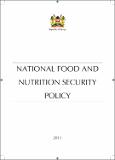National Food and Nutrition Security Policy 2011
View/
Publication Date
2011Author
Type
Policy Paperviews
downloads
Metadata
Show full item recordBy
Ministry of Agriculture
Abstract/
Food and nutrition security refers to a situation where all people, at all times, have physical and economic access to sufficient, safe and nutritious food to meet their dietary needs and food preferences for an active and healthy life. Currently over 10 million people in Kenya suffer from chronic food insecurity and poor nutrition, and between two and four million people require emergency food assistance at any given time. Nearly 30% of Kenya’s children are classified as undernourished, and micronutrient deficiencies are widespread. The Government of Kenya is strongly committed to reducing hunger and malnutrition. This includes efforts to build self-reliance to reduce chronic food insecurity, as well as measures to assist those in need when emergencies occur. Linking relief with longer-term development efforts helps mitigate the potential impact of future emergencies. The new Food and Nutrition Security Policy (FNSP) provides an overarching framework covering the multiple dimensions of food security and nutrition improvement. It has been purposefully developed to add value and create synergy to existing sectoral and other initiatives of government and partners. It recognizes the need for multi-public and private sector involvement, and that hunger eradication and nutrition improvement is a shared responsibility of all Kenyans. The policy and associated actions will remain dynamic to address contextual changes and changing conditions over time. This policy is framed in the context of basic human rights, child rights and women’s rights, including the universal ‘Right to Food’.
Publisher
Government of KenyaSeries
Policy Paper; 2011;Collections
- Policy Papers [117]

